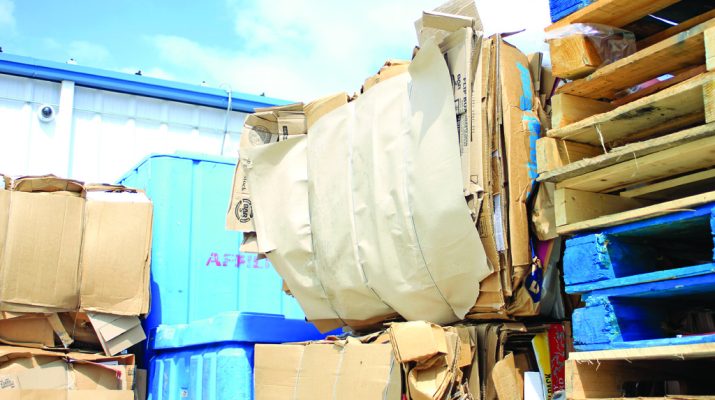Recycling makes sense for Box Butte County businesses. Keep Alliance Beautiful helps save cents by picking up (primarily) cardboard on a regular basis free of charge. So, an area establishment that recycles always hosts one of our totes or trailers, right? Not necessarily. Tons of material that could end up in the landfill every month travel back in semi-truck trailers where the store’s freight had been as part of a reuse and recycle policy.
Dollar stores and grocery stores are two examples of businesses in Alliance that recycle through the company transport network. Dollar General sends cardboard back from their two stores here on their trucks compared to Family Dollar Dollar Tree, which recycles through KAB. Not too long ago, the recycling center saw its cardboard volume rise one week as we helped Safeway compensate during repairs to their baler.
Grocery Kart, however, is the most interesting local example of this method, in my opinion. I often glance at their parking lot while passing by with a load. Second Street is a preferred route with a pickup stacked full of cardboard – much easier to retrieve a wayward box or two than in the middle of Third Street. By the store’s dock may be a combination of bales, pallets and large boxes or containers waiting for a ride. A visual testament to the management and staff’s willingness to reduce, reuse and recycle.
Manager Becky Maser described recycling and other environmentally friendly practices at the store. She has been with Grocery Kart since 1990 and manager for 21 years.
Trucks arrive Monday through Wednesday from a warehouse in Norfolk, Neb., and return with almost everything necessary to ship food and other products found on the shelves. Becky said they produce 4-6 bales of cardboard a week (about the same size as KAB’s). Plastic and wood pallets also go back as well as “blue bunkers,” 4x4x5-foot containers for ice cream and frozen food, she explained. The warehouse also takes plastic wrap and bags – both used in the store and shopping bags gathered in a barrel well-sed by customers. Plastic coated boxes are the only containers that have to be thrown away.
Becky said, “Other Grocery Karts send their cardboard back. I can’t speak for the other stores (served through the warehouse), it works for us to send it.”
The amount of cardboard increased when the Covid pandemic hit and has been staying steady otherwise, she said.
Although the store sells bottled water, it also promotes saving plastic with a water filling station to reuse jugs. The machine purifies Alliance’s municipal water. A person from the company cleans and checks filters once a month and “keeps it where it needs to be so you’re getting filtered water,” Becky noted. Unlike public filling stations, such as Alliance schools have added, there is no counter of “bottles saved.” Yet Becky said they see a lot of people come through every week with jugs. “It’s a convenience when you’re shopping, you don’t have to go somewhere else.”
Recently, a display near the produce section was labeled “made from 100 percent recycled cardboard.” This is an option Becky is in favor of if it is an option.
More than other retail businesses, grocery stores handle perishable inventory. Planning and experience reduce waste. “Our guidelines are if it’s a day or two of expiration we mark it down, if it’s expired we don’t sell,” she explained. “For a new department manager it’s a struggle to learn those things . . . for the most part they know what they need to order to make sure their department is full and fresh. The biggest obstacle is whether we are going to get that amount. Grocery Kart works to throw away as little as possible.”
Whether through KAB or corporate channels, recycling brings tangible results – less refuse in the landfill and more resources for new products and materials. “It helps the community with everything that goes on and it helps my business,” Becky said.

